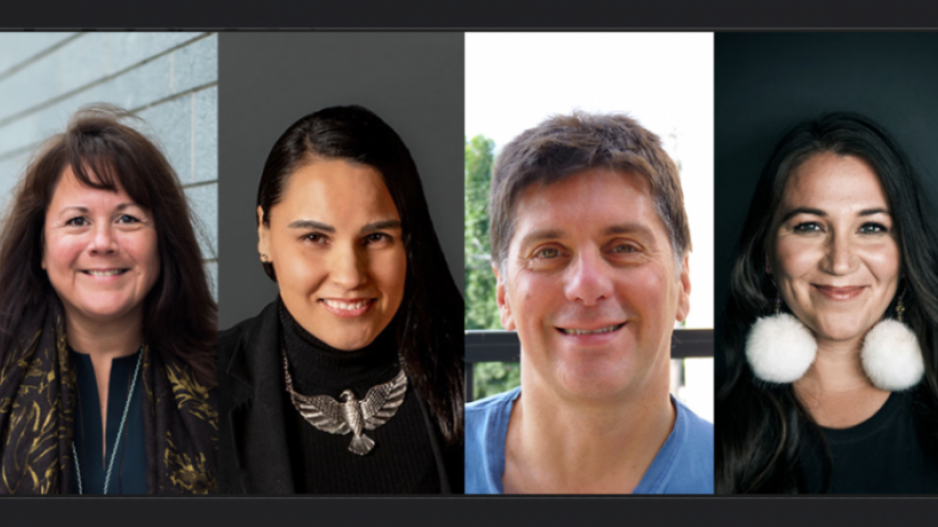Carol Anne Hilton is of Nuu-chah-nulth descent from the Hesquiaht [Hess-kwee-at] Nation on Vancouver Island. As CEO and founder of the Indigenomics Institute and the Global Centre of Indigenomics, her work revolves around increasing global visibility, growth and inclusion of Indigenous business worldwide.
With this goal in mind, she accepted an appointment to TELUS as a council member on the Indigenous Advisory Council (IAC) and the opportunity to help build a stronger, more inclusive future for Indigenous Peoples.
“TELUS is demonstrating tremendous leadership in the economic Reconciliation space and can have the greatest impact in Reconciliation by helping to advance Indigenous economic strength and the growth of Indigenous communities – of creating the space for inclusion,” says Hilton.
In April 2022, TELUS formed the Indigenous Advisory Council, which comprises respected Indigenous leaders and professionals with experience providing guidance and advice, to support the effective implementation of TELUS’ commitments outlined in the tech company’s Indigenous Reconciliation Action Plan (IRAP).
The creation of IAC comes as TELUS continues its mission to build on a deeper commitment to Reconciliation with Indigenous Peoples. The initiative follows four fundamental pillars: connectivity, economic Reconciliation, cultural responsiveness and enabling social outcomes by developing and expanding programs that help strengthen communities.

Wah’nah’juss Hilth’hooiss Meares Island, BC. Photo credit: Mason Mashon, Saddle Lake Cree Nation
For generations, Indigenous Peoples have been excluded from decisions about their own communities and lands. TELUS measures the success of the IRAP by the experiences of Indigenous peoples, striving to ensure that Indigenous voices are represented at every step of the strategy level. This approach is critical in maintaining an open pathway to Reconciliation while promoting systemic change. Through the IAC and IRAP, TELUS aims to demonstrate reciprocity by supporting truth-telling, amplifying Indigenous voices, and building meaningful relationships with Indigenous peoples and communities.
“We have incredible beauty and talent in our Indigenous communities across Canada that needs to be seen and heard, and TELUS’ IRAP is an opportunity to shine a light on all of that,” says Dr. Kim van der Woerd of 'Na̱mg̱is First Nation.
The Indigenous Advisory Council is co-chaired by TELUS board member Sean Willy, President and Chief Executive Officer of Des Nedhe Development and member of North Slave Métis Alliance, and Shazia Zeb Sobani, TELUS Vice-President of Customer Network Implementation.
Along with Hilton, the council includes Dr. Kim van der Woerd of 'Na̱mg̱is First Nation, Shani Gwin of Alberta Métis Nation, and Luc Lainé of Huron-Wendat Nation. Council members will serve two-year terms with six additional members appointed in 2023. Additionally, the group advises TELUS on relationship development, with Indigenous peoples while sharing Indigenous values and teachings as respected voices of their communities.
Supporting Indigenous-led solutions
Last year, TELUS launched the TELUS Indigenous Communities Fund to provide flexible grants to Indigenous-led programs supporting Indigenous Peoples across Canada. By putting funds directly into the hands of Indigenous leaders and community groups who know their communities best, the TELUS Indigenous Communities Fund grants support initiatives and Indigenous programs that meet social, health, cultural, and community needs.
“A good example of TELUS’ impact is in creating space for the inclusion of Indigenous-owned and controlled businesses through impact investing through the Pollinator Fund,” says Hilton.
The TELUS Pollinator Fund for Good is a long-standing commitment to communities by leveraging the power of technology to drive better social outcomes and economic growth. The Pollinator Fund invests in next-generation start-ups and entrepreneurs addressing the biggest challenges in health, education, agriculture, and the environment by connecting them with the resources and capital necessary to grow and thrive.
“The Indigenous economy exists outside the confines and boundaries of all that we know today about modern economics and its measurements of growth,” continues Hilton. “As Indigenous Peoples, it exists within our relationships to ourselves, to each other, to the earth, to our past and to our future.”

Mt Currie, BC. Photo Credit Mason Mashon, Saddle Lake Cree Nation
Finding strength in connection
TELUS has long supported investments with Indigenous communities and bridging digital divides by connecting Canadians to its world-leading networks.
It is committed to doing its part to respond to the key frameworks of Reconciliation, including the United Nations Declaration on the Rights of Indigenous Peoples, The Truth and Reconciliation Commission’s 94 Calls to Action, and the 231 Calls for Justice as laid out in Reclaiming Power and Place: The Final Report into the National Inquiry into Missing and Murdered Indigenous Women and Girls.
Specifically, Call for Justice 15 was identified as an opportunity for TELUS to leverage its technology to support Indigenous-led organizations and Indigenous-led solutions to support Indigenous women and girls. As part of the commitment to the Calls for Justice, TELUS partnered with the Alberta Native Friendship Centres Association, BC Association of Aboriginal Friendship Centres, Prince George Native Friendship Centre, and Native Courtworker and Counseling Association of British Columbia on the Mobility for Good for Indigenous Women at Risk program.
This program provides mobile devices with talk, text, and data plans free of charge to Indigenous women and girls at risk or surviving violence. As an ongoing commitment, TELUS is expanding the program across the country in partnership with Indigenous-led organizations coast-to-coast.
TELUS recognizes that Reconciliation is facilitated through reducing inequalities between Indigenous and non-Indigenous communities. These efforts include expanding connectivity solutions to Indigenous communities so that communities can benefit from the same opportunities to work, learn, and stay connected with loved ones through its nation-leading network.
Since 2000, the company has invested nearly $220 billion nationally in network infrastructure, operations, and spectrum, including connecting 151 communities and 71 First Nations in B.C., Alberta, and eastern Quebec to the gigabit-enabled TELUS PureFibre network.

Mount Garibaldi, BC. Photo Credit Mason Mashon, Saddle Lake Cree Nation
By the end of 2023, the company is committed to connecting an additional 20 Indigenous communities in serving areas to their advanced broadband networks. These investments were made possible through partnerships with the Governments of Canada and British Columbia, as well as the All Nations Trust Company. The funding and support provided by these government partners have helped make the rapid transformation in Indigenous connectivity outcomes a reality.
“I look forward to supporting TELUS in their Reconciliation efforts by providing insight into trends in Indigenous economic growth and supporting the design of corporate relationships with Indigenous communities,” says Hilton.
As a leader in social capitalism, TELUS is committed to continuing to learn, evolve and grow to ensure they are aligned with Indigenous-led Reconciliation frameworks through ongoing engagement with Indigenous leaders, Elders, and communities in the areas they serve.
With guidance from the IAC, TELUS will ensure the development and implementation of the Indigenous Reconciliation Action Plan (IRAP) positively impacts future generations to come.
To learn more about TELUS’ commitment to Reconciliation and to read the 2021 Reconciliation and Indigenous Connectivity Report, visit telus.com/reconciliation.




